
Hoardings are not only illegal, but have become an eyesore.
Credit: DH File Photo
The Karnataka High Court on Wednesday termed the BBMP of being “the first enemy of the city”, while hearing a PIL on illegal hoardings/flexes.
A division bench comprising Chief Justice Prasanna B Varale and Justice Krishna S Dixit said that while on one hand the BBMP is not getting any revenue from the illegal advertisements, on the other it utilises taxpayers’ money to remove them, thereby burdening the citizens.
The bench was hearing a batch of petitions on the issue of illegal hoardings/flexes in the city.
Senior advocate Prof Ravivarma Kumar, appearing for one of the petitioners, submitted that the officers of the BBMP are hand in glove with the advertisers.
“None of the advertisement hoardings are legal in the city. One can see hundreds of advertisement hoardings, including on the flyovers. The advertisers are putting up these hoardings and change the hoardings frequently without there being any check,” he said.
Kumar further said that Section 158 of the BBMP Act prohibits any advertisements without written permission of the chief commissioner. He said that neither the statement of objections nor the affidavit refers to information as to how many permissions are granted by the corporation and, if granted, what is the amount collected as fee against such hoardings.
At this stage, Justice Krishna Dixit observed that illegal hoardings are a huge issue and involves losses of thousands of crores as revenue to the corporation.
“It is a loss of revenue to the BBMP and to fill up that loss, you (BBMP) will burden the citizens. This is the problem. You are the first enemy of the city,” Justice Dixit said.
Considering the submissions made by Kumar, the division bench has directed the BBMP to conduct a survey of hoardings/boards/flexes erected in the BBMP jurisdiction.
Hoardings are not only illegal but have become an eyesore.
Credit: DH FILE PHOTO
The court has also asked the BBMP to submit a tabular statement detailing permissions granted, whether the permissions were granted for a specific period and what action is taken by the corporation if the specific period is over and still the display of advertisements continues.
“What is the line of action proposed by the corporation and stipulated timeline to complete the proposed action, including any penal action against such wrongdoers. The corporation is to submit a tabular statement in respect of these details ranging from the last three years,” the bench said.